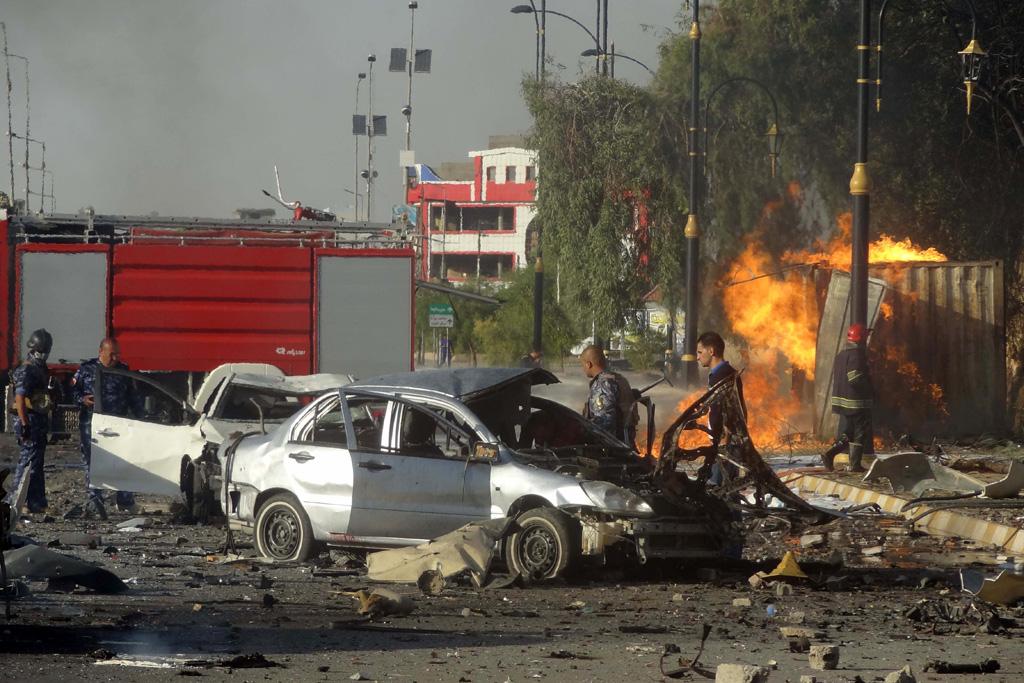‘Revenge attacks’ in Iraq kill more than 20
Iraqi emergency service personnel inspect the sit of a roadside bomb attack near under-construction buildings in the Kurdish-controlled northern Iraqi city of Kirkuk, Aug. 23, 2014.
BAGHDAD, Iraq — Two suicide bombers in Iraq killed at least 17 people in apparent revenge attacks after a major assault on a Sunni mosque heightened sectarian tensions.
In Baghdad, a bomber rammed a vehicle into an intelligence headquarters on Saturday, killing at least eight people, police and medical sources said. Near Tikrit, a suicide bomber driving a military Humvee packed with explosives attacked a gathering of soldiers and Shia militias on Friday night, killing nine.
Shia militiamen machinegunned 68 worshipers at a village mosque in Diyala Province on Friday as politicians try to form a power-sharing government capable of countering Islamic State militants.
An advance by Islamic State through northern Iraq has alarmed the Baghdad government and its Western allies and drawn US airstrikes in Iraq for the first time since the withdrawal of American troops in 2011.
Although the air campaign has caused a few setbacks for Islamic State, they do not address the far broader problem of sectarian warfare which the group has fueled with attacks on Shias.
Bombings, kidnappings and execution-style shootings occur almost daily, echoing the dark days of 2006-2007, the peak of a sectarian civil war.
The Islamic State routed Kurdish forces in its latest advance through the north.
On Saturday, three bombings that appeared to be targeting Kurdish forces killed at least six people in the city of Kirkuk, 155 miles north of Baghdad, security sources said.
Two of Iraq's most influential Sunni politicians suspended participation in talks on forming a new government after the militiamen carried out the mosque attack.
Deputy Prime Minister Saleh Mutlaq and Parliament Speaker Salim al-Jibouri have pulled out of talks with the main Shia alliance until the results of an investigation into the killings are announced.
Jibouri, a moderate Sunni, condemned both Islamic State as well as the Iranian-trained Shia ;militias who Sunnis say kidnap and kill members of their sect with impunity.
"We will not allow them to exploit disturbed security in the country to undermine the political process. We believe the political process should move on," he told a news conference on Saturday.
Iraq's new Shia prime minister, Haider al-Abadi, faces the daunting task of trying to draw Sunnis into politics after they were sidelined by his predecessor Nuri al-Maliki.
Maliki stepped aside after pressure from Sunnis, Kurds, some fellow Shia, Iran and the United States.
Iran, a regional power broker with deep influence in Iraq, is sending its foreign minister, Mohammad Javad Zarif, to Baghdad on Sunday for talks with Iraqi officials.
(Reporting by Ahmed Rasheed; Writing by Michael Georgy; Editing by Rosalind Russell)
Every day, reporters and producers at The World are hard at work bringing you human-centered news from across the globe. But we can’t do it without you. We need your support to ensure we can continue this work for another year.
Make a gift today, and you’ll help us unlock a matching gift of $67,000!
